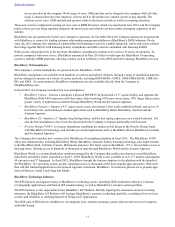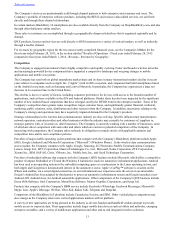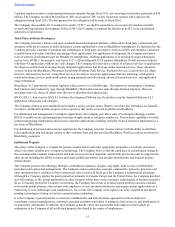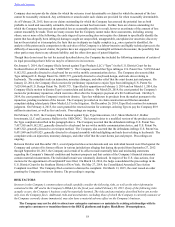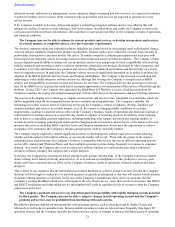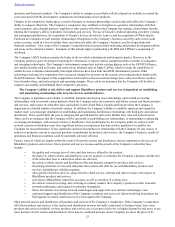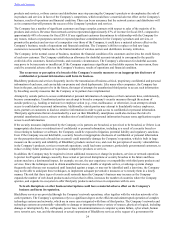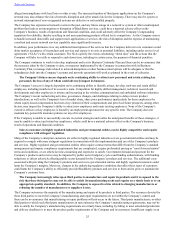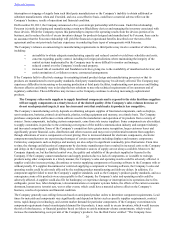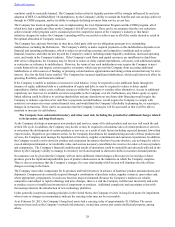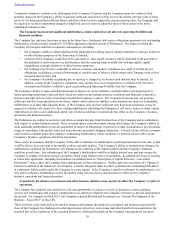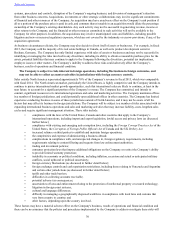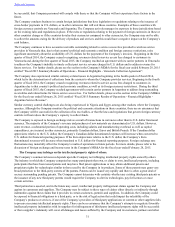Blackberry 2015 Annual Report Download - page 30
Download and view the complete annual report
Please find page 30 of the 2015 Blackberry annual report below. You can navigate through the pages in the report by either clicking on the pages listed below, or by using the keyword search tool below to find specific information within the annual report.
Table of Contents
21
advanced security, mobile device management, secure enterprise instant messaging and other services, are expected to continue
to generate monthly service revenue. Other customers who do not utilize such services are expected to generate less or no
service revenue.
If the Company is unable to develop, deliver and support a compelling integrated software and services offering that will
mitigate the decline of service revenue relating to SAF in the manner described above and enable the Company to recover the
costs associated with its network infrastructure, this could have a material adverse effect on the Company’s results of operations
and financial condition.
The Company may not be able to enhance its current products and services, or develop new products and services,
in a timely manner, at competitive prices, or to meet customer requirements.
The wireless communications and embedded software industries are characterized by increasingly rapid technological change,
evolving industry standards, frequent new product introductions, frequent market price reductions, constant improvements in
performance characteristics and short product life cycles. To remain competitive, industry participants must keep pace with
technological developments, satisfy increasing customer requirements and achieve product acceptance. The Company’s future
success depends upon its ability to enhance its current products and services and provide for their compatibility with evolving
industry standards and operating systems, to address competing technologies and products developed by other companies, and
to continue to develop and introduce new products and services offering enhanced performance and functionality on a timely
basis at competitive prices. In particular, the Company’s future success is significantly dependent on its ability to promote the
adoption of the BES12 platform and the Classic and Passport smartphones. The Company is also focused on marketing and
enhancing its value-added enterprise software and service offerings that leverage the Company’s strengths such as BBM,
security and manageability to generate revenue and increase the user base. The Company believes that an increase in the user
base for the BBM service in particular could lead to increased opportunities for monetization of the services offered through the
platform. In fiscal 2015, the Company also announced the BlackBerry IoT Platform, a secure, cloud-based platform for
machine to machine messaging and endpoint management, with an initial focus on the automotive and asset tracking industries.
The process of developing new technology is complex and uncertain, and involves time, substantial costs and risks, which are
further magnified when the development process involves multiple operating platforms. The Company’s inability, for
technological or other reasons, some of which may be beyond the Company’s control, to enhance, develop, introduce and
monetize products and services in a timely manner, or at all, in response to changing market conditions or customer
requirements, could have a material adverse effect on the Company’s business, results of operations and financial condition or
could result in its products and services not achieving market acceptance or becoming obsolete. In addition, if the Company
fails to deliver a compelling customer experience, including marketing, sales support, activation and ongoing support, or
accurately predict emerging technological trends and the changing needs of customers and end users, or the features of its new
products and services, including BES12 and the Classic and Passport smartphones, do not meet the expectations or achieve
acceptance of its customers, the Company’s business and prospects could be materially harmed.
The Company may be required to commit significant resources to developing new software and services before knowing
whether such investment will result in software or services the market will accept. These risks are greater in the wireless
communications market because the Company’s software is compatible with devices that run on different operating systems
such as iOS, Android and Windows Phone, and these multiple operating systems change frequently in response to consumer
demand. As a result, the Company may need to release new software updates at a much greater pace than a traditional
enterprise software company that supports only a single platform.
In the past, the Company has encountered delays relating to new product introductions. If the Company experiences further
delays relating to the launch of already announced or yet to be announced smartphones or other products or services, such
delays could have a material adverse effect on the Company’s business, results of operations, financial condition and future
prospects.
There cannot be any assurance that the technologies and related hardware or software products and services that the Company
develops will be brought to market by it or network operators as quickly as anticipated or that they will achieve broad customer
acceptance among operators or end users. In the case of the Company’s smartphones, there can be no assurance that the
Company’s existing BlackBerry Bold users will migrate to the new Classic device. Also, there can be no assurance that BES10
and BES12 installations and value-added service subscriptions will result in equivalent levels of revenue to what the Company
experienced in the past.
The Company's products and services are dependent upon interoperability with rapidly changing systems provided
by third parties. The Company may not be able to adapt to changes in such operating systems and the Company's
products and services may be prohibited from interfacing with such systems.
BlackBerry's platform depends on interoperability with operating systems, such as those provided by Apple, Google and
Microsoft, as well as device manufacturers. Because mobile operating systems are released more frequently than legacy PC
operating systems, and the Company typically has limited advance notice of changes in features and functionality of operating


